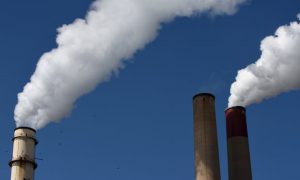Climate Change Poses a Widening Threat to National Security
The Homeland Security, Defense Department and CIA collectively communicated the climate risks they face.

The Homeland Security, Defense Department and CIA collectively communicated the climate risks they face.

Commitments for GHG reductions by countries in advance of the COP26 meeting next week would result in temperature rise of 2.7ª C by end of the century. Alternatives discussed.

The poll surveyed 1,000 American adults and found that 70% said global warming was happening. More than 60% said oil and gas companies were “completely or mostly responsible”. But sharp partisan divides also exist.

New research from CCL, RMI and NREL shows that ALL 4 of Nevada’s Congressional Districts benefit economically from clean energy buildout. Liaisons take note: State-level and district-level reports available in the story.

Yale released a recent survey showing overwhelming voter support for US financial and technical aid to poorer countries to help them reduce GHGs. Quick read, good stats.

Cement is responsible for 7% of global GHGs. If it were a country, it would be the third largest emitter. behind only China and the US.

[Editor’s Note:] Business is leading the way, with a firm commitment they publicly make and track. Here’s a great infographic explanation.

Jane observes that the climate crisis requires collective action and a sense of hopelessness may occasionally descend. But the antidote to that feeling is to do something. The question is: what?

This ignores the need for power when the sun doesn’t shine, but counters the argument that solar needs an unreasonably large footprint.

A survey just reported by Yale University and George Mason University shows 69% of all registered voters support a carbon fee and dividend policy.

This recap from CCL’s Strategy Coordinator has useful tips and arguments to use now that Manchin has said he won’t support the Clean Electricity Program. Great ideas, good links.

Faced with the likely demise of a central pillar of President Biden’s agenda, the White House and Senators scamble to find alternatives. Will carbon pricing emerge instead?